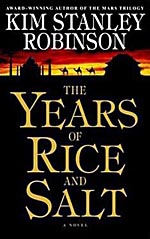
![]() Bormgans
Bormgans
11/30/2022
![]()
Robinson shows himself to be an idealist, having written yet another "romance in which humanity struggles to work out its dharma, to better itself, and so generation by generation to make progress, fighting for justice, and an end to want, with the strong implication that we will eventually work our way up to the source of the peach blossom stream, and the age of great peace will come into being."
But, as always with Robinson, it is more complex than that, because Zhu Isao, the fictional founder of the League of All Peoples School of Revolutionary Change, continues that passage. It is probably the most explicit formulation of Robinson's own poetics, so any Robinson aficionado would do well to read this carefully, more so, it should be of any interest to any student & lover of literature.
"It is a secular version of the Hindu and Buddhist tale of nirvana succesfully achieved. (...) The opposite of this mode is the ironic or satiric mode, which I call entropic history, from the physical sciences, or nihilism, or, in the usage of certain old legends, the story of the fall. In this mode, everything that humanity tries to do fails, or rebounds against it, and the combination of biological reality and moral weakness, of death and evil, means that nothing in human affairs can succeed. Taken to its extreme this leads to (...) people who say it is all a chaos without causes, and that taken all in all, it would have been better never to have been born. These two modes of emplotment represent end-point extremes, in that one says we are masters of the world and can defeat death, while the other says that we are captives of the world, and can never win against death. (...) two other modes of emplotment (...) tragedy and comedy. These two are mixed and partial modes compared to their absolutist outliers (...) they both have to do with reconciliation. In comedy the reconciliation is of people with other people, and with society at large. The weave of family with family, tribe with clan -- this is how comedies end, this is what makes them comedy: the marriage with someone from a different clan, and the return of spring. Tragedies make a darker reconciliation. (...) they tell the story of humanity face-to-face with reality itself, therefor facing death and dissolution and defeat. Tragic heroes are destroyed, but for those who survive to tell their tale, their is a rise in consciousness, in awareness of reality, and this is valuable in and of itself, dark though that knowledge may be. (...) Now, I suggest that as historians, it is best not to get trapped in one mode or another, as so many do; it is too simple a solution, and does not match well with events as experienced. Instead we should weave a story that holds in its pattern as much as possible. It should be like the Daoists's yin-yang symbol, with eyes of tragedy and comedy dotting the larger fields of dharma and nihilism. That old figure is the perfect image of all our stories put together, with the dark spot of our comedies marring the brilliance of dharma, and the blaze of the tragic knowledge emerging from black nothingness. The ironic history by itself, we can reject out of hand. Of course we are bad; of course things go wrong. But why dwell on it? Why pretend this is the whole story? Irony is merely death walking among us. It doesn't take up the challenge, it isn't life speaking. But I suppose we also have to reject the purest version of dharma history, the transcending of this world and this life, the perfection of our way of being. It may happen in the bardo, if there is a bardo, but in this world, all is mixed. We are animals, death is our fate. So at best we could say the history of the species has to be made as much like dharma as possible, by a collective act of the will. This leaves the middle modes, comedy and tragedy. (...) Surely we have a great deal of both of these. Perhaps the way to construct a proper history is to inscribe the whole figure, and say that for the individual, ultimately, it is a tragedy; for the society, comedy. If we can make it so."
A bit later, might Robinson talk about himself? "Zhu Isao's own predilection was clearly for comedy. He was a social creature." Whatever the answer, it is clear that, as a species, we need more weaving indeed, more cooperation, more family. Isn't that as good a meaning as any -- especially if you consider Robinson's one line version of human history: "Meanwhile a kind of monkey kept on doing more things, increasing in number, taking over the planet by means of meanings."
Highly recommended -- except chapter 9.
Full review on Weighing A Pig Doesn't Fatten It
https://schicksalgemeinschaft.wordpress.com/2022/11/28/the-years-of-rice-and-salt-kim-stanley-robins